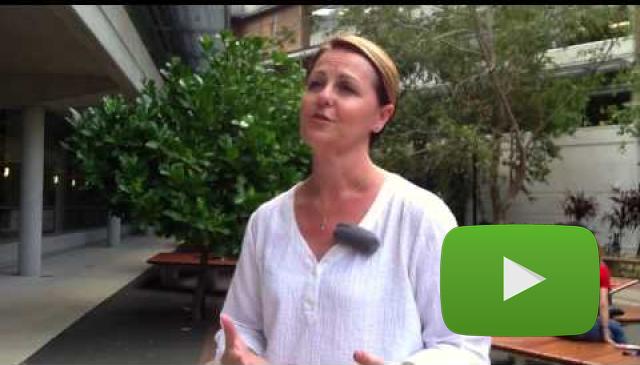Interactive Dynamic Learning Environment
Educator
Belinda Gibbons | University of Wollongong | bgibbons@uow.edu.au
Key Features
- Simulator: Interactive Dynamic Learning Environment (IDLE)
- Students: Undergraduate (third year), internal students
- Class Size: 1000+
- Assessment: Essay (35%), Tutorial Lab Sessions (10%), Tests (5%), Authentic Tasks (50%)
- Pedagogy: 13 week capstone subject
Background
IDLE (which stands for Interactive Dynamic Learning Environment) was created at the University of Wollongong (UOW) to address the lack of a simulation that adequately covers corporate social responsibility and sustainability issues. The simulation is embedded into a subject called Simulation of a Socially Innovative Enterprise, which is a capstone subject for both the Bachelor of Commerce and the Bachelor of Business at UOW. The use of IDLE also helps the UOW to meet its commitment as signatories to the Principles of Responsible Management Education (PRME). Belinda says that:
We couldn’t find one [simulation] that was total enterprise but included corporate social responsibility and sustainability, so to allow the students to experience the interaction between their decision-making. So that’s, I guess what our simulation does and we specifically had to design and develop it to meet that need that we wanted in our degree.
The simulation is designed to be in a virtual environment with students placed in teams of three. As commerce courses comprise of multi-disciplinary subjects, IDLE is designed to make approximately fifty business decisions based on knowledge gained over an extended period of three to four years.
Learning Aims
Simulation of a Socially Innovative Enterprise enables students to apply the principles of ethical, socially responsible, and sustainable commerce in a web based designed simulated business environment. The subject is based on a series of lectures and an action based learning project. In the action learning project students will form multidisciplinary teams and run a simulated business (which may include private, public and not for profit organisations) twenty four hours a day for a period of several weeks. Students will be required to make multidisciplinary interactive decisions based on sound ethical, socially responsible and sustainable practice.
Pedagogy
IDLE is currently being offered in computer laboratory classes on campus but can be accessed in a cloud environment:
- Online lecture access via Moodle - Weeks 8-12: Students then change to accessing information and lectures online to encourage independent and autonomous learning. Pre-recorded lectures and learning material is all available via Moodle and can be accessed at the students’ convenience however the expectation is that the students will read the weekly material prior to lectures and tutorials.
- Tutorial/Seminar/Workshop Times – Weeks 2-7 then 8-13: Students are required to attend a one hour tutorial in weeks 2-7 and undertake weekly assessment tasks that contribute to their overall result. During weeks 8-13, students will then attend a two hour computer laboratory to actually utilise IDLE in a team environment.
Belinda says: ‘I don’t consider it a game…but it’s definitely fun. It’s engaging and it’s interactive’.
Assessment
The assessment tasks include four main tasks with weekly tests or authentic tasks that add up to their overall result. The essay is 2,000 words and requires in-depth theory to underpin all arguments that relate to socially innovative and socially responsible practices in a commercial practice. The report is also designed to demonstrate critical analysis, grammar and structure in writing. In session tests include a variety of tasks by examining current newspaper articles and reporting back via presentations, and other authentic tasks being Board reports, simulation participation, group decisions and exams.
| Assessment | Responsibility | Weight |
|---|---|---|
| Essay | Team | 35% |
| Tutorial Lab Classes | Team | 10% |
| In session Tests | Team | 5% |
| Authentic Tasks | Team | 50% |
Resourcing
The main resourcing is the lectures either online or the traditional face-to-face. The library and internet are utilised to gain appropriate commercial examples and newspaper articles on social sustainability. There also must be tutors and facilitators of IDLE, access to computer laboratories and on-site IT support as the software was developed internally. Belinda states that:
They have an IDLE player’s guide, so they have a booklet. In that booklet there are obviously instructions on how to play the simulation, but also writing area where they can jot down their thoughts as they go through. Each lab has, I guess a range of learning objects associated with the subject, but one of the main ones is a set of digital stories.
Outcomes
‘From a student perspective it’s just a fun way to learn...It’s just so different for them in a business education environment…, its risk free and it allows them to experience that [risk free decisions]’ says Belinda. It was also acknowledged that often the students strive to achieve financial success by analysing data but the subject is designed to expand the students’ mental models, to see a wider and different perspective by incorporating social responsibility issues.
Belinda commented: ‘I guess too that one of the big things was trying to lose that profit maximisation paradigm that they sort of get pushed into when it’s very discipline specific. I think that allowing them to see that they can make a profit by doing it in different ways’. IDLE appears to fit the overall aims and objectives of the subject by having a custom made business simulation.

